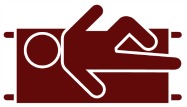It has been dead for a while. Most of December at least. The thin industrial blankets kept there are as cold as a fish, offering little comfort. An "Out of Order: Cold Blankets Only" sign hangs on its door.
We still have the two warmers in our trauma rooms, but they are on the far side of the department from triage and you have to intrude on the patients in those rooms to fetch them.
Long ago, I made it my habit to stop by the blanket warmer to grab one for any patient I brought to a room. A warm blanket was my one consolation after unceremoniously pointing to a hospital gown and saying "it opens in the back."
The ice machine is down too. So it is hard to get ice chips for patients when mouths are dry.
There are worse things, and more important pieces of equipment. Heaven knows we can't bill insurance for the price of a warm blanket. Yet, it is one of the acts of nursing that has a great deal of influence on a patient's visit.
When people come in to the hospital, they are suffering from more than just pain or illness. They are anxious, often struggling with fear of the unknown and loss of control.
Few who come into the emergency room planned this as part of their day. Their world is disrupted and no longer operating at their direction - even if their emergency is minor. Most of us these days operate on tight schedules and coveted interludes of weekends and vacations. Moments are precious and thus organized for consumption. Disruption by an illness or accident throws everything up the air. Who will let the dogs out; get the kids off the school bus; cover for me at work?
Then there is the fear of the diagnosis. Is it serious? Will I need an operation? How will I pay for this? Cold beds, long waits, hurried doctors combine with the unkowns to stretch taut fraying nerves.
Stress and pain are intricately linked. While we are still learning about the relationship, the physiological response to stress appears to increase our receptivity to pain and reduce our immunological response. Long term, stress can increase our susceptibility to a number of different disease processes. If we can -- in little ways -- reduce the stress of a emergency room visit, it is one more tool we have to help patients get better.
While I can no long grab a warm blanket on the way back to the room, I can address a patient's fear and stress in other ways. I give information and reassurance and that is another tool I have.
We who live and breathe the hospital air have a good idea what the doctor is going to want and what will happen soon, and what we will have to wait for. The patients usually has no idea. So I tell them what to expect the best I can and prepare them if they are going to have to wait for tests to come back. I offer myself as a guide to their visit and offer to answer questions.
"I don't know" -- when it is the truth -- is a perfectly good answer as well. Explaining the variables, the known and unknown helps build trust in the patient, which in turn reduces stress and allays fears.
While the practice of medicine gains ever more sophistication in science and technology, we always must remind ourselves that our profession is an art as well as a science. Our interactions with patients influence the success of our brief role in their care.
So when you look at it from that perspective, the blanket warmer can be a pretty important piece of equipment after all.
Further Reading:
Stress and Anxiety backgrounder from New York Times Health Guide


